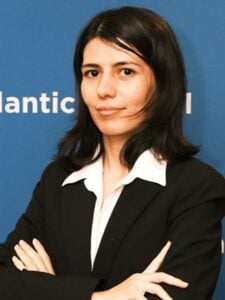Digital Forensic Workshop 2025
Overview
This workshop aims to provide the selected audience with the necessary understanding of the overall threat landscape and the knowledge to develop resilient, practiced teams that can adeptly respond to FIMI and other online harms targeting the information environment. As much as possible, training sessions will incorporate an interactive approach to maximize the hands-on application of skills and will include regional case studies to highlight the practical implications of the material.
About the Trainers
 |
Kenton Thibaut is a senior resident China fellow at the Atlantic Council’s Digital Forensic Research Lab (DFRLab), where she leads China programming for the Democracy + Tech Initiative. In this role, Thibaut serves as head of China research and principal investigator for projects analyzing China’s role in the global technology ecosystem and its foreign-policy priorities in the digital space. Before joining the DFRLab, Thibaut spent five years in the private sector, specializing in Chinese government relations. Previously, she conducted research on Chinese elite politics at the Brookings Institution’s John L. Thornton China Center. Thibaut is a PhD candidate at Georgetown University, focusing on comparative cross-border data policy. Thibaut is a security fellow at the Truman National Security Project and a term member of the Council on Foreign Relations. She holds an MA in international economics from the Johns Hopkins School of Advanced International Studies (SAIS).
Thibaut is also an adjunct professor in Georgetown University’s Security Studies Program. |

|
Esteban Ponce de León is a resident fellow at the Digital Forensic Research Lab (DFRLab) of the Atlantic Council. Esteban specializes in open-source research, online disinformation, and influence operations, with a focus on developing open-source intelligence tools and research methods grounded in data science. His work focuses in developing methods to integrate artificial intelligence models into digital research workflows to enhance open research, as well as developing methodology frameworks to assess artificial intelligence language models capabilities and risks for the information environment. |
 |
Daniel Suárez Pérez is a research associate for Latin America at the Atlantic Council’s Digital Forensic Research Lab (DFRLab) based in Colombia. As a Colombian journalist, Daniel has experience in armed conflict researches and journalism projects to investigate violence against local leaders and communities in Latin America. Daniel have been working in collaboration with organizations to promote data journalism and empower women in media, such as Chicas Poderosas, Hacks/Hackers and School of Data. Daniel research focus is identifying, exposing and explaining disinformation on digital media in Latin America. |
 |
Sayyara Mammadovais a research associate at the Atlantic Council’s Digital Forensic Research Lab (DFRLab) and the pedagogical lead for its internationally recognized Digital Sherlocks training program. Mammadova specializes in disinformation, fact-checking, and open-source intelligence (OSINT), investigating malign influence operations and disinformation campaigns online. She also trains others in open-source investigative techniques and tools to combat disinformation and regularly delivers talks on disinformation and digital investigative methods. In addition to her research, Mammadova actively contributes to the global fact-checking community. She assesses fact-checking organizations through the International Fact-Checking Network (IFCN) at Poynter and the European Fact-Checking Standards Network (EFCSN), promoting high standards within the fact-checking ecosystem. She also led the development of TG Collector (TGC), an open-source project that facilitates Telegram-based investigations for researchers. |
 |
Valentin Châtelet is a research associate for security at the Atlantic Council’s Digital Forensic Research Lab based in Belgium. Châtelet researches disinformation, ethnic movements, and political activism throughout post-Soviet countries, the Baltic states, Russia, and Belarus. As a self-taught programmer, he has worked for the French private sector as a geographic information systems engineer, developing software for geolocation purposes. He has also worked with the French defense ministry as data-driven analyst on war areas specializing in open-source intelligence and social media. He held a redactor position within the French think-tank Nemrod-Enjeux Contemporains de Défense et de Sécurité with a focus on Russia, terrorism, and cybernetic conflicts. Châtelet advocates for the development of uralistics, having worked as an interpreter for Russian-speaking refugees. He obtained three bachelor’s degrees, one in geography from the Paris-Sorbonne University and the others in international relations and Estonian language from the French National Institute for Foreign Cultures. He has studied briefly at the Tallinn Summer University where he was twice awarded the Archimedes Language Scholarship and conducted research on the native people of Udmurtia in Izhevsk, Russia while attaining his master’s degree in geopolitics at the French Institute for Geopolitics. |
|
|



 Add to Google calendar
Add to Google calendar
 Add to Outlook calendar
Add to Outlook calendar





